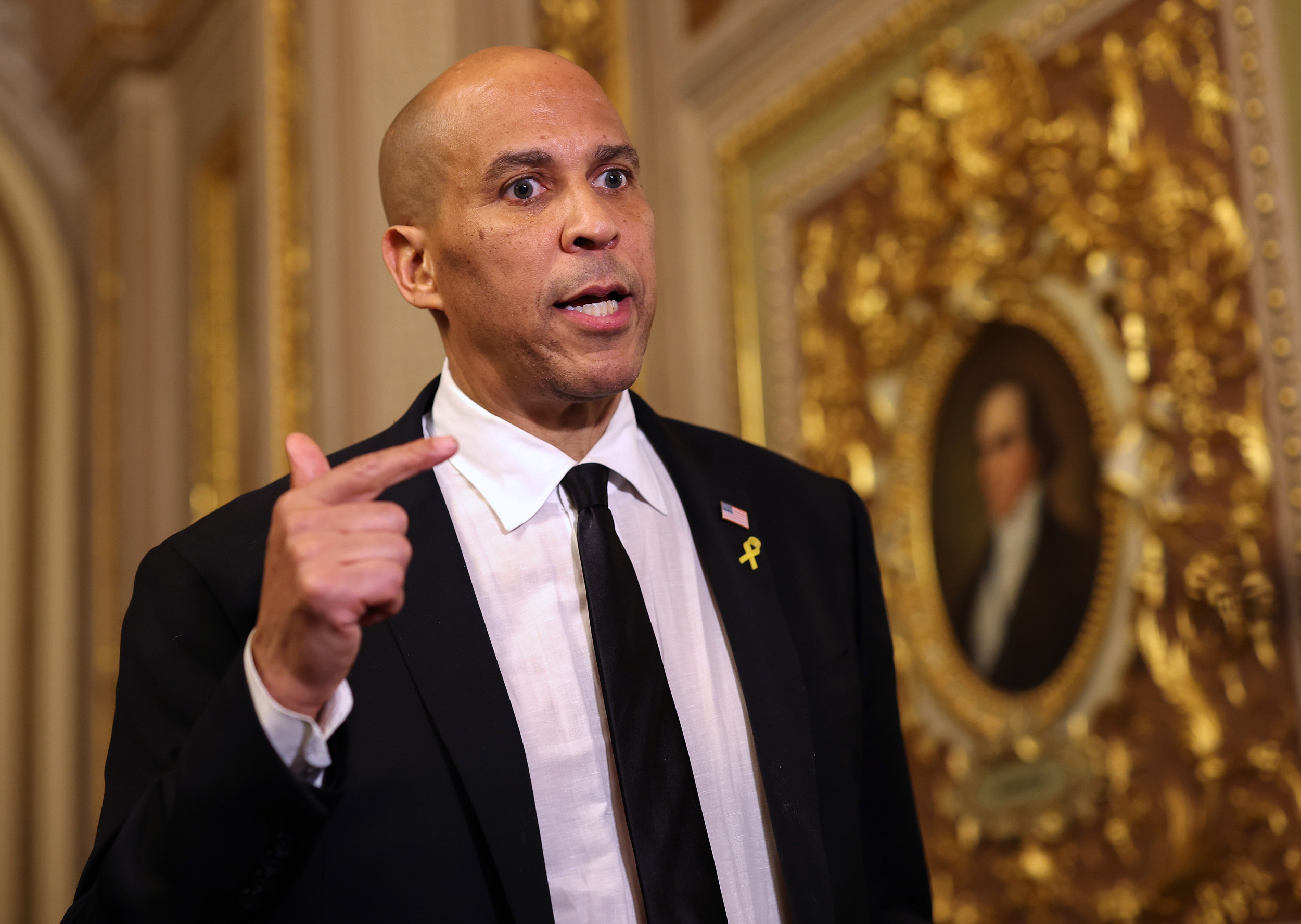Senator Cory Booker’s record-breaking speech has stirred presidential speculation, but experts told Newsweek it’s too early to know how viable of a candidate he may be in 2028.
Newsweek reached out to Booker for comment via his office and political team.
Why It Matters
Booker, a New Jersey Democrat, delivered a 25-hour filibuster speech on the Senate floor this week lambasting President Donald Trump’s administration. He broke the record for the longest Senate filibuster ever, surpassing the late South Carolina Senator Strom Thurmond’s speech opposing the Civil Rights Act of 1957.
Booker’s speech resonated with many Democratic voters, who have been yearning for stronger opposition to Trump from their party’s elected official, potentially giving him a chance to become a lead messenger for the party as they seek to carve out their strategy for opposing Trump. It has also led to some social media chatter about whether Booker could become a front-runner in the 2028 presidential primary.
Tasos Katopodis/Getty Images
What To Know
Booker, who ran for president in 2020, hasn’t officially said he’s interested in taking another shot at the Oval Office. But some view the speech as a way for him to reintroduce himself to Democratic voters ahead of what is likely to be a crowded primary.
Early polls suggest Democrats are divided about who should lead the party into 2028. Former Vice President Kamala Harris, who lost to Trump in November, appears to be an early favorite if she chooses to run again, but the election is still years away, and there’s plenty of time for other candidates to break through.
A Morning Consult poll conducted among Democratic voters from March 14 to March 16, 2025, showed that just 3 percent planned to vote for Booker in the 2028 primary if he runs for president.
That places him behind Harris, former Transportation Secretary Pete Buttigieg, Representative Alexandria Ocasio-Cortez, Minnesota Governor Tim Walz, California Governor Gavin Newsom, businessman Mark Cuban and Pennsylvania Governor Josh Shapiro.
An Echelon Insights poll conducted among 1,007 likely voters from March 10 to March 13 showed Booker’s support at only 2 percent.
Kevin Hagan, a Democratic strategist from New Jersey with Princeton Public Affairs Group, told Newsweek he hopes Booker is interested in running for president. He called the senator’s speech an “impressive and important show of defiance” that put him “front and center” with voters.
Hagan said Booker represents a “new generation of Democrats” needed in the White House and congressional leadership.
“As Democrats prepare for the next presidential election, it’s never too early,” he said. “And Senator Booker has the leadership ability to touch voters both intellectually and emotionally, and has a proven track record to stand up on issues for New Jersey and the country as a whole.”
Costas Panagopoulos, a political science professor at Northeastern University, told Newsweek on Wednesday that Booker’s speech raised his national profile and allowed him to fill a messaging gap within the Democratic Party. However, it’s too soon to tell whether his speech will translate into a viable presidential bid.
“It remains to be seen whether his speech is anything more than a symbolic achievement, but it certainly raises his own personal national profile in a way that could be helpful for him to seek higher office as president in 2028,” Panagopoulos said. “But it is one of many considerations that will have to be taken into account that will influence how far he would go in the presidential process.”
Booker’s reputation as one of the more liberal senators may cause some Democratic voters to question his electability for a general election, Panagopoulos said. The primary is also likely to be a crowded field, and his viability will, in part, depend on the strengths other candidates bring to the field.
Still, he would be an “energetic” candidate who could mobilize the Democratic base, which Panagopoulos said is increasingly important in nominating contests.
Anne Danehy, a professor at Boston University’s College of Communications, told Newsweek that while Booker’s speech “absolutely could” boost any presidential ambitions, a key question he faces is how to sustain this momentum over the next three years.
“It’s quite a long time, and voters have a very short memory,” she said. “So what they love today, something else might pop up that’s more interesting to them. So it depends on how the landscape unfolds.”
Danehy said it’s “unrealistic” to expect Booker to keep up the same energy level over the next few years and that he would need to develop a strategy to build momentum, which would include staying engaged, frequent media appearances and building a strong brand.
Dan Cassino, professor of Government and Politics at Fairleigh Dickinson University, told Newsweek Booker has made himself “the face of congressional resistance” against Trump.
If Booker plans to run, voters will start seeing him campaigning with like-minded candidates nationwide in 2026 and using his leadership PAC to fund them.
“I imagine some of those trips would take him to some early primary states—purely by coincidence, of course—where he’d have a chance to meet with donors and activists,” Cassino said.
He said Booker’s personal story is a strength, but that one question he will face is whether his “relentless focus on positivity is a good match for the moment when voters might want confrontation.”
Of course, before 2028, Booker faces reelection in New Jersey, a state that shifted toward Republicans in 2024. While former President Joe Biden carried the state by about 16 points, Harris won it by less than six points.
Panagopoulos said Booker will have to address whether his more liberal voting record is still in line with the state during his reelection. Booker hasn’t said he plans to run yet, but election forecaster Cook Political Report classifies the Senate race as “Solid Democrat,” meaning it’s not considered competitive.
Booker ran in the 2020 presidential primary but struggled to break through the crowded field of candidates. He ended his campaign in January 2020 after failing to qualify for a debate ahead of the Iowa caucuses.
Danehy said Booker struggled to connect with some voters because his message was more focused on working with Republicans, which locked in the “power and anger” voters sought at the time.
His Senate speech is more emblematic of a message Democratic primary voters want to hear, she said. However, to avoid a repeat of 2020, Booker will need to develop a message that is more than opposing Trump and can focus on how he could turn the economy around.
“Cory Booker, he can’t just talk about being anti-Trump for three and a half years,” she said. “He has to have his own message about what he has done and why he is a good alternative because there is going to be a lot of Democrats coming out and running.”
What People Are Saying
Ross K. Baker, distinguished professor emeritus of Political Science at Rutgers University, told Newsweek: “Thoughts of the presidency are never far from Senator Booker’s mind, but I do think that his talkathon was more of a morale-booster for the sagging spirits of Democrats than a prelude to a presidential announcement.”
GOP Pollster Frank Luntz told NewsNation: “He struck the kind of tone that grassroots Democrats are looking for. He gave them a reason to fight. He gave them a reason to stand up and say, ‘This is my country too.’ Of course, every Republican watching will say, ‘This is nonsense.’ But he’s not speaking just to Republicans. He’s speaking to Americans.
“What I saw over the last 25 hours absolutely blew me away. And just as you sometimes make projections or predictions, I’m going to do one right here. That speech puts Cory Booker as one of the leaders in the Democratic Party 2028.”
What Happens Next
Several other Democratic politicians are viewed as potential front-runners. Harris hasn’t said what she plans to do and is considered a possible candidate for California’s governor race next year. Gavin Newsom, the state’s current governor, is speculated to be a potential presidential candidate, as is Buttigieg, who has declined to seek office in Michigan next year.
Most candidates will likely start announcing runs after the 2026 midterms, though some could announce earlier.















